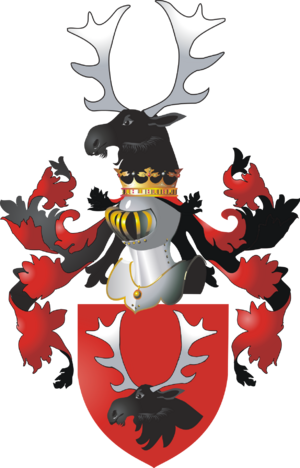Hans Erasmus Aßmann facts for kids
Hans Erasmus Aßmann, Freiherr von Abschatz (born February 4, 1646 – died April 22, 1699) was an important German statesman and poet. He lived in the 1600s and was part of a group of writers known as the "second Silesian school" of poetry.
A Look at His Life
Hans Erasmus Aßmann was born in a place called Würbitz, which was in Silesia. Silesia was a region that was part of the Holy Roman Empire at that time. Even though his parents passed away when he was young, Hans worked hard. He went to college in Liegnitz and then studied law at universities in Strasbourg and Leyden.
After his studies, he spent three years traveling. He visited countries like Belgium, France, and Italy. When he was 23, he returned to Silesia. He took over managing his family's estate and got married to Anna von Hund in 1669. He was quite well-off financially, and his personal life was happy, except for the sadness of losing some close family members.
His Political Career
Hans Erasmus Aßmann was very good at managing his own lands. This talent led him into politics. When the last Duke of Liegnitz died, Silesia became part of Austria. Hans was chosen to represent his region at the emperor's court in Vienna two times. The first time, he represented the Duchy of Liegnitz. The second time, he represented all the lands of Silesia.
The Emperor, Leopold I, was impressed by Hans. He made him a baron, which is a noble title. In 1679, Hans was chosen to be a permanent representative for Legnica. He attended the meetings of the Silesian rulers, which were called Fürstentage (Princes' Days) in Breslau. Through all his work for the public, he earned a lot of respect from the people in his home country. He once said that the best thing someone could have on their tombstone was the words: "he was an honest man in his fatherland."
A Talented Poet
Hans Erasmus Aßmann was also a well-known poet. He belonged to a group of writers called the "second Silesian school." Other famous writers in this group included Daniel Casper von Lohenstein and Andreas Gryphius. Hans was a close friend of Lohenstein. He was also a skilled translator, meaning he could change books from one language to another. For example, he translated a famous Italian play called Il pastor fido.
It was quite special for a nobleman like Hans to be so interested in poetry back then. This showed a new way of thinking about literature. It meant that Germany was starting to catch up with the literary developments happening in places like France and England. Hans himself hoped for this kind of progress. He once said that "Nobility without personal merit is nothing but an empty house on foreign grounds." He believed that while noble people might be involved in government and military, it was their smart ideas and creative minds that truly brought them the greatest fame.
 | James Van Der Zee |
 | Alma Thomas |
 | Ellis Wilson |
 | Margaret Taylor-Burroughs |


